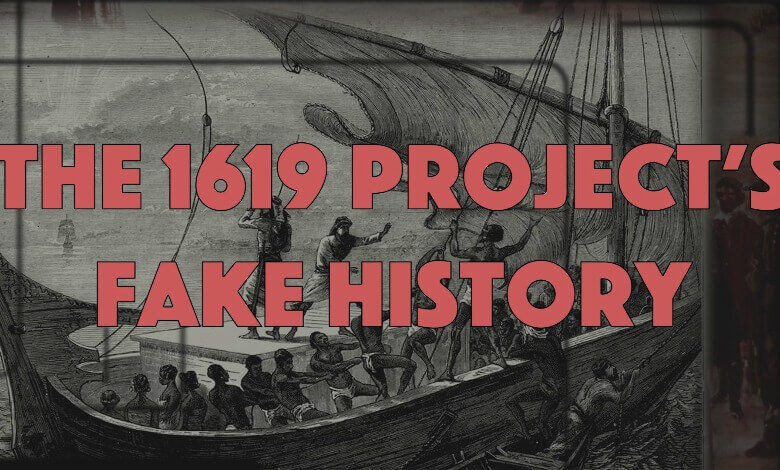The Battle For America’s Understanding of Its True Self
Why the serially flawed '1619 Project' deserves an 'Architects of Woke' takedown

Earlier this month, New York Times’ journalist Nikole Hannah-Jones won a Pulitzer Prize for creating “The 1619 Project.”
The celebrated series aims to “reframe our country’s history” around our alleged “true founding.” Jones says this reframing revolves around the first importation of enslaved Africans to Virginia in 1619. Beyond the project’s massive impact on the journalistic community, it’s also been turned into a hugely influential K-12 curriculum that is being taught in every state across the nation.
The Pulitzer Prize win was surprising to many given the project has been demolished by historians who’ve disputed the “facts” Jones presents in the work.
In fact, the project’s foundational claim that enslaved Africans were first brought to America’s English colonies in 1619 was found to be false. Nell Irvin Painter, a professor emerita of American history at Princeton University, found that those early Africans were not enslaved but were rather indentured servants, and they joined a population of white European indentured servants in America.
And famed Brown University historian Gordon Wood found the 1619 Project’s claim that the American Revolution began out of a desire by the colonists to preserve the slave trade was false as well. These are just two of many other serious errors in the project.
So why are curricula being developed and a Pulitzer Prize being awarded to a journalism project with well-documented factual errors? Because ultimately the project does not rest on facts, it rests on narrative and tribalism.
It may seem counter-intuitive, but people often want to believe that slavery and racism is the core of the American story, albeit subconsciously. This is because recognizing and fighting perceived oppression understandably makes one feel noble and part of the good fight.
And if that’s the position one wants to hold, there are plenty of facts to support it.
Such a person might respond to the project’s historical inaccuracies with ‘so what if the indentured servants of 1619 weren’t slaves, you’re saying slavery wasn’t a major issue in America before the civil war?’
Or ‘so what if the American Revolution wasn’t about protecting slavery, our founding fathers were still slave owners!’ One can always fall back from a factual error to a new line of defense for the same position.
RELATED: ‘Loudest Voice’ Savages News Aimed at Red State USA
Getting people to believe the competing narrative however, that although America has many flaws, the story of our nation is the tale of the liberation of more people from oppression than anywhere else in the world, cannot be done with facts alone. Both perspectives have facts to back them up, and it’s not like 1619 Project supporters don’t know what the Bill of Rights was.
But one narrative is more correct than the other, and to win people over, they must want to see that one narrative as right and the other, 1619’s, is wrong. People want to feel they are standing on the noble side and pushing back on the bad guys; those who see the factual problems with 1619 Project need to prove they are on the side of the good guys.
That’s why the film I produced, “The Architects of Woke: The 1619 Project’s Fake History,” expands the criticism of the 1619 Project to include the source of much of their material, Professor Gerald Horne.
At first glance, the authors of the 1619 Project’s essays are estimable Ivy League professors and acclaimed journalists. Like the New York Times generally, they carry a brand of prestige and respectability. But look deeper at where those respected thinkers are getting their views and things get messier.
Professor Horne has said positive things about brutal dictators, including Robert Mugabe and Fidel Castro. And he referred to the fall of the Soviet Union as a “geopolitical catastrophe.”
As he lauds some of the most oppressive regimes in world history, he simultaneously claims the American founding was about the “freedom to enslave.” He’s the source for 1619’s provably incorrect claim that this is what the American Revolution was truly about.
Preferring Mugabe to America means Horne’s vision of freedom and the good society is one that is anathema to most Americans.
For people interested in fighting oppression and liberating human beings, allying with someone like Professor Horne should raise questions. But when people see the sanitized messaging in The New York Times, they don’t see Horne’s radicalism, they simply see the center-Left good guys sticking up for the societally disadvantaged.
To win the battle for America’s understanding of itself, that needs to change. People need to understand a far-Left agenda is behind more of the center-Left’s messaging than they realize.
As Jordan Peterson has argued, the center-Right usually understands when other Right-wingers have gone too far and excludes them from the movement (see white nationalists); but the center-Left has much less conception of when other Left-wingers have gone too far (see Mugabe/Castro fans).
Those on the Left need to see that truth. They need help understanding their political tribe is far from pure and noble, but full of unsavory elements who fight for oppression (even if they subjectively don’t believe that’s what they’re doing).
And they need to understand how the very narrative of America they reject – one that sees a nation that protects the rights of the individual and, despite its flaws, has continued to value that founding principle — is an important tool in fighting oppression.
—————–
Jake Klein manages the Capital Research Center’s media operations center.
